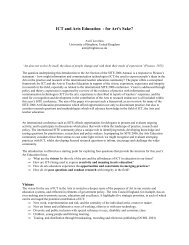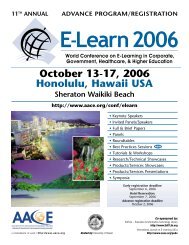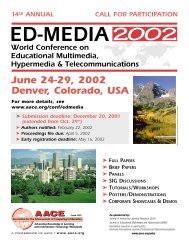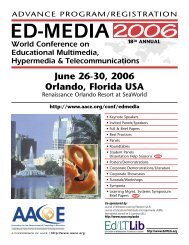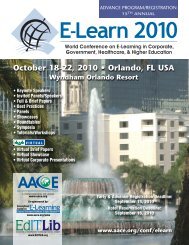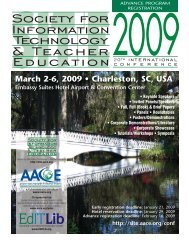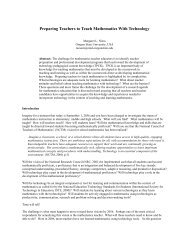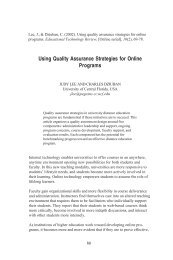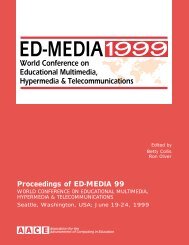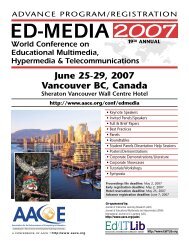ED-MEDIA 1999 Proceedings Book - Association for the ...
ED-MEDIA 1999 Proceedings Book - Association for the ...
ED-MEDIA 1999 Proceedings Book - Association for the ...
You also want an ePaper? Increase the reach of your titles
YUMPU automatically turns print PDFs into web optimized ePapers that Google loves.
As has already been mentioned all WBT users obtain <strong>the</strong>ir personal study room. This is <strong>the</strong> main environment <strong>for</strong><br />
WBT users that <strong>the</strong>y see when working with <strong>the</strong> system. The personal study room provides all <strong>the</strong> navigational<br />
features as well as all administrative features accessible to <strong>the</strong> users such as profile, helper and agent management,<br />
personal business cards and more.<br />
In <strong>the</strong> study room WBT users also always get a dynamic overview of actually enroled and already finished courses<br />
as well as suggested courses according to <strong>the</strong>ir interests and skills.<br />
If allowed by <strong>the</strong> system administrators WBT users also can get a limited amount of space on <strong>the</strong> server. This space<br />
can <strong>for</strong> example be used to upload additional material into <strong>the</strong>ir personal workspace in <strong>the</strong> study room. If desired<br />
WBT users can also declare parts of <strong>the</strong>ir personal workspace publicly readable if <strong>the</strong>y want to publish special<br />
additional material to a course.<br />
Ano<strong>the</strong>r part of <strong>the</strong> study room is a basic personal messaging system that works similar to email but via <strong>the</strong><br />
courseware server. Using this messaging system WBT users and teachers can communicate with each o<strong>the</strong>r and<br />
manage <strong>the</strong>ir message space as can be done with email. The advantage of this messaging system compared to email<br />
is <strong>the</strong> availability on <strong>the</strong> server. Users can quickly read and write messages from everywhere without needing access<br />
to <strong>the</strong>ir email system. This feature is especially important <strong>for</strong> trainers that are travelling a lot and do not want to scan<br />
all <strong>the</strong>ir email from somewhere in <strong>the</strong> world to find out about new questions asked.<br />
Offline Discussion Area Management<br />
Two different offline discussion facilities are part of GENTLE, offline discussion <strong>for</strong>ums and personal messaging<br />
which has already been discussed above. Offline discussion <strong>for</strong>ums are structured according to <strong>the</strong>ir topics and are<br />
usually belonging to certain courses. Depending on <strong>the</strong>ir course access rights WBT users have access to certain<br />
<strong>for</strong>ums and can insert questions, notes or opinions.<br />
As an example students could find an unclear <strong>for</strong>mulation in <strong>the</strong> courseware and want to clarify that point. In this<br />
case <strong>the</strong>y only have to mark <strong>the</strong> unclear text area and a simple click on a button in <strong>the</strong> course environment of <strong>the</strong>ir<br />
personal study room opens a dialog. The dialog automatically maintains a pointer to <strong>the</strong> marked unclear section and<br />
lets <strong>the</strong> users write some text. Besides also <strong>the</strong> type of discussion entry can be selected, at <strong>the</strong> moment question,<br />
answer, agree, disagree, remark and hint are supported. Then <strong>the</strong> whole entry with <strong>the</strong> pointer to <strong>the</strong> unclear section<br />
is inserted into <strong>the</strong> discussion <strong>for</strong>um. Besides also an email message is sent to <strong>the</strong> trainer to alert him of <strong>the</strong> new<br />
entry if desired. The trainer <strong>the</strong>n opens <strong>the</strong> <strong>for</strong>um, finds <strong>the</strong> new entry and immediately sees due to <strong>the</strong> special icon<br />
that this is <strong>for</strong> example a question. When opening <strong>the</strong> question <strong>the</strong> trainer obtains <strong>the</strong> question text toge<strong>the</strong>r with <strong>the</strong><br />
automatically generated pointer to <strong>the</strong> unclear section in <strong>the</strong> courseware. Now <strong>the</strong> trainer can answer <strong>the</strong> question in<br />
<strong>the</strong> same way <strong>the</strong> WBT user asked it and <strong>the</strong> answer is inserted into <strong>the</strong> <strong>for</strong>um and automatically interlinked with <strong>the</strong><br />
question. The answer itself can <strong>the</strong>n be subject to new questions or remarks and so <strong>for</strong>th resulting in an offline<br />
discussion. Discussions need not be publicly accessible, WBT users as well as trainers also have <strong>the</strong> possibility to<br />
declare entries private which means that only <strong>the</strong> persons involved in <strong>the</strong> discussion can read <strong>the</strong>m.<br />
Shared <strong>Book</strong>mark Management<br />
Experience with WBT systems has shown that many users search <strong>the</strong> Web <strong>for</strong> additional in<strong>for</strong>mation and store<br />
interesting pages in <strong>the</strong>ir client-side bookmark files. The result is that all <strong>the</strong> users have to do a lot of work to find<br />
partially overlapping material. For this reason GENTLE also provides a facility to maintain bookmarks that are<br />
shared amongst WBT usergroups. Whenever WBT users find an interesting document <strong>the</strong>y can simply click on a<br />
button in <strong>the</strong>ir environment that opens a shared bookmark dialog. In this dialog <strong>the</strong>y can mark <strong>the</strong> usergroup <strong>for</strong><br />
which <strong>the</strong> pointer is interesting and insert <strong>the</strong> URL that <strong>the</strong>y found with some additional description. O<strong>the</strong>r users<br />
being members of this workgroup <strong>the</strong>n find <strong>the</strong> interesting entry <strong>the</strong> next time <strong>the</strong>y look into <strong>the</strong> group document. It<br />
is also possible to install a user agent that automatically in<strong>for</strong>ms <strong>the</strong> group members of new entries in <strong>the</strong> shared<br />
bookmarks via email.<br />
Online Discussion Announcement Management



